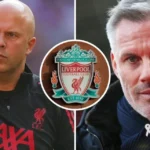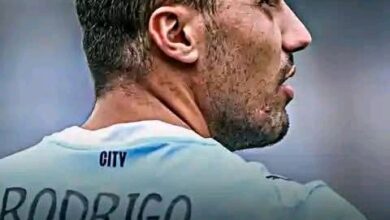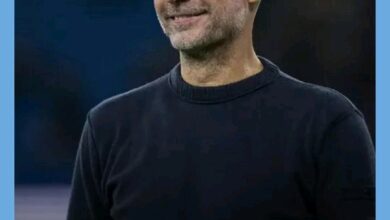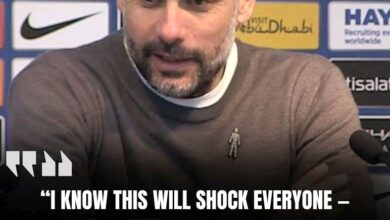Liverpool Star Refuses National Team Call-Up After Man City Defeat
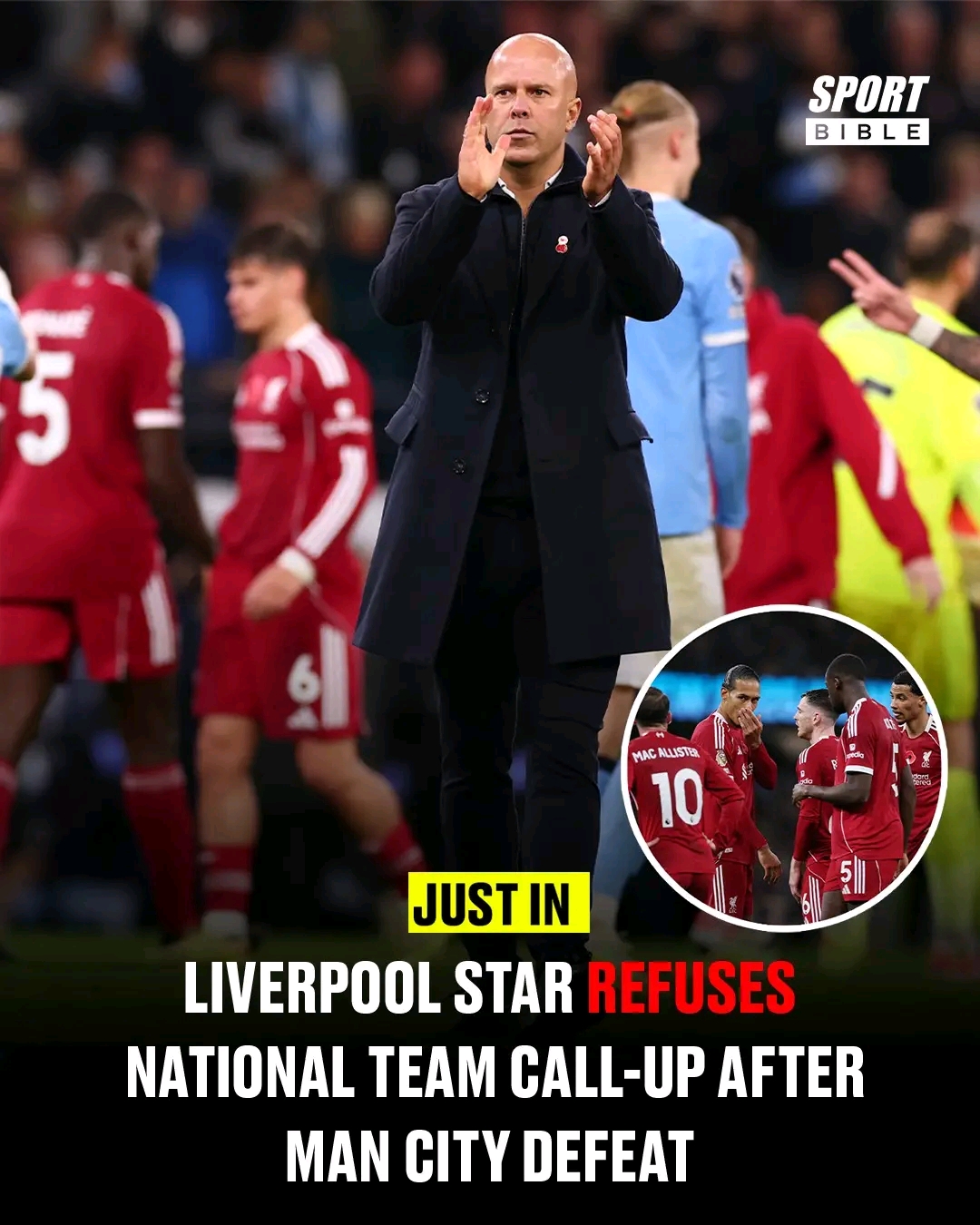
Liverpool’s disappointing 3–0 loss to Manchester City on Sunday has left more than just their Premier League title hopes in question. In the aftermath of the defeat, a surprising revelation from Italy manager Gennaro Gattuso has added a new layer of intrigue to Liverpool’s turbulent season. Federico Chiesa, one of Liverpool’s marquee signings and Italy’s attacking talisman, has reportedly refused a call-up to the Italian national team for their upcoming World Cup qualifiers — a decision that has sent ripples through both club and country.
Sunday’s match at the Etihad Stadium was billed as a test of Liverpool’s resilience under new manager Arne Slot, but the Reds fell apart against a relentless Manchester City side. Pep Guardiola’s men dominated from start to finish, punishing defensive lapses and capitalizing on Liverpool’s lack of cohesion. Goals from Phil Foden, Erling Haaland, and Bernardo Silva sealed a comfortable 3–0 victory, leaving Liverpool’s players visibly deflated.
Chiesa, who started the game on the bench, was brought on in the 83rd minute — far too late to influence proceedings. By that point, the result was beyond doubt, and his brief cameo served only to highlight a growing frustration among Liverpool supporters. Many fans questioned why the Italian international, known for his pace and creativity, wasn’t introduced earlier to inject energy into an otherwise lifeless attack.
Liverpool’s defeat marked their fifth loss in six Premier League fixtures, extending a miserable run that has seen them slip down the table. The club’s struggles have been compounded by inconsistency in team selection, injuries, and an apparent lack of confidence within the squad. Arne Slot’s tactical vision, still in its infancy, has yet to bear fruit
Federico Chiesa arrived at Liverpool amid much fanfare. The 27-year-old forward, who made his name at Fiorentina and Juventus before moving to Merseyside, was expected to bring flair and directness to Liverpool’s attack. Known for his relentless work rate and ability to cut inside from the wing, Chiesa seemed a natural fit for the Premier League’s intensity.
However, his Liverpool career has not gone according to plan. Despite flashes of brilliance, Chiesa has struggled for consistent game time under Slot, featuring primarily as a substitute. This season, he has made eight Premier League appearances — already surpassing last season’s tally of six — and scored twice, but all his appearances have come off the bench.
For a player of Chiesa’s calibre, being reduced to a bit-part role has been difficult to accept. Supporters have voiced their disappointment on social media, arguing that Slot has failed to utilize one of his most dynamic attacking weapons effectively. Chiesa’s Player of the Month award in September, voted by fans, only underlined his popularity and potential impact when given minutes. Speaking to *Sky Sports* last week, Chiesa acknowledged both the support from fans and his desire to justify their faith:
“Last year, I didn’t play that much, so having this support back from the fans was a good reason to try to give more, which I do on a daily basis. Having the support from the fans at your back helps you to give more. I think they like me because I always try to give my best. Every time I play, I give everything I have. I think I show it, and I’m happy for that.”
Despite this optimism, his limited involvement has become an increasingly contentious issue — and now, his decision regarding the Italian national team has added fuel to the fire
In a press conference on Monday, Italy manager Gennaro Gattuso confirmed that Chiesa had declined an invitation to join the Azzurri for their crucial upcoming World Cup qualifying matches against Moldova and Norway. The announcement shocked Italian journalists, who pressed Gattuso for an explanation.
“I often talk to him,” Gattuso told reporters, as quoted by *Football Italia*. “We have to respect the decisions and problems that each of us has. We know well what we tell each other, and I must respect what the player tells me. I can’t say anything else.”
When asked directly if Chiesa had chosen not to be involved, Gattuso confirmed bluntly:
His tone suggested frustration — not necessarily at Chiesa, but at the persistent questions surrounding the forward’s absence. Gattuso made it clear that he would not publicly criticize his player but emphasized that the choice was Chiesa’s alon
Chiesa’s reasons for refusing the call-up remain unclear. Officially, neither the player nor Liverpool has issued a statement. Speculation among Italian media has ranged from personal issues to concerns about form and fitness.
Although Chiesa has managed to stay injury-free this season, his history of muscle problems looms large. Last year, he missed 14 matches due to a persistent muscle injury — a setback that hampered his integration into the Liverpool system. Prior to that, he endured a lengthy layoff while at Juventus following a serious knee injury sustained in early 2022.
Given this history, some pundits have suggested that Chiesa might be prioritizing rest and recovery, especially amid Liverpool’s grueling fixture schedule. Others, however, believe his refusal may reflect deeper frustration with his current situation — both at club level and within the national team setup
For Italy, Chiesa’s absence could not come at a worse time. Gattuso’s squad faces a challenging road to qualification for the 2026 World Cup. The Azzurri currently sit third in Group I, three points behind second-place Norway. With a goal difference of +10 compared to Norway’s +26, Italy’s path is narrow — they must win both remaining qualifiers against Moldova and Norway and hope that Norway falters in their final match against Estonia.
Chiesa has long been seen as a difference-maker for the Azzurri, capable of unlocking defences with his speed and tenacity. His performances during Italy’s Euro 2020 triumph are still fresh in fans’ memories — especially his stunning goals against Austria and Spain that propelled Italy toward the title.
However, since October 2024, Chiesa has not appeared for Italy, largely due to injuries and inconsistent club form. Gattuso’s tenure as national coach has seen him attempt to rebuild a more cohesive, youthful squad, but Chiesa’s experience and leadership remain invaluable assets.
Without him, Italy must rely on emerging talents like Giacomo Raspadori, Mateo Retegui, and Domenico Berardi — talented players, but none with Chiesa’s big-game pedigree. His decision to stay away has sparked debates among Italian fans and pundits about player commitment and national prid
For Liverpool, Chiesa’s withdrawal from international duty may come as a blessing in disguise. With two weeks free from international commitments, he will remain at Melwood to train under Arne Slot and work on regaining form and sharpness.
Slot, who replaced Jürgen Klopp earlier this year, has faced immense pressure as Liverpool’s form has nosedived. After a promising start, the Reds have lost six of their last nine matches in all competitions, including heavy defeats to Tottenham, Aston Villa, and now Manchester City.
Critics argue that Slot’s tactical approach — emphasizing possession and pressing in a 4-2-3-1 formation — has yet to suit the squad’s strengths. Mohamed Salah has struggled for consistency, Darwin Núñez remains erratic in front of goal, and midfield balance has been elusive.
Chiesa’s attributes — direct running, tactical intelligence, and a knack for exploiting space — could provide the missing spark. However, integrating him effectively requires more than late cameos. Fans have repeatedly urged Slot to start the Italian alongside Salah and Núñez to inject creativity and unpredictability into Liverpool’s attack
Following the defeat to City, social media platforms were awash with frustration from Liverpool fans. Many questioned Slot’s decision-making and called for Chiesa to seek a move away in January if his playing time does not improve.
“Why keep Chiesa on the bench when we’re crying out for pace and energy?” one fan wrote on X (formerly Twitter). “If he doesn’t start getting minutes, he should leave for his own good.”
Another user added, “Chiesa deserves better. You don’t sign one of Italy’s best players just to use him for ten minutes a game. Madness.”
The sentiment among the fanbase is clear: they see Chiesa as a potential game-changer who has not been given a fair chance to prove himself in England.
Those close to Chiesa describe him as intensely professional and driven — a player who hates sitting on the sidelines. His father, Enrico Chiesa, was himself an Italian international and a prolific striker in the 1990s. Growing up, Federico inherited not only his father’s talent but also his fierce sense of pride and responsibility when representing both club and country.
Friends have hinted that the current situation has weighed heavily on him. Being sidelined for extended periods — first due to injury, then due to tactical decisions — has tested his patience. Yet, Chiesa has not expressed anger publicly; instead, he has focused on training and maintaining peak condition.
His refusal to join the Italy squad, therefore, may not be an act of rebellion but a moment of reflection — a rare pause for a player who has endured relentless physical and mental demands over the past few years. It could be his way of resetting, regaining focus, and preparing for a strong second half of the season
Gennaro Gattuso, now in charge of Italy, knows Chiesa well. The former AC Milan and Italy midfielder has long admired the winger’s work ethic and competitive spirit. Yet, Gattuso is also a manager who values discipline and clarity above all else. His handling of the situation has been pragmatic — refusing to criticize but making it clear that the door remains open for Chiesa when he is ready.
Gattuso’s Italy has faced challenges of its own. Following Roberto Mancini’s departure and Luciano Spalletti’s brief tenure, the national team entered another period of transition. Gattuso’s appointment was initially met with skepticism, but his fiery leadership style and tactical nous have earned cautious optimism among fans.
Nevertheless, his side’s inconsistency in qualifying has raised questions about depth and creativity — areas where Chiesa’s absence is most keenly felt. “When Chiesa is on the pitch, we play with more courage,” said Italian pundit Fabio Caressa on *Sky Sport Italia*. “He brings unpredictability and belief. Without him, Italy look more predictable, more static.”
As Liverpool enter a critical phase of their season, and Italy prepare for decisive qualifiers, both sides are navigating uncertainty. For Chiesa, this moment feels like a crossroads in his career — one that could shape the next chapter of his journey.
At 27, he is approaching what should be his prime years. He has proven his quality on the biggest stages — from the Champions League to the European Championships — yet finds himself fighting for relevance in a new environment. Whether he can reclaim a regular starting place under Slot, or whether a move elsewhere may reignite his career, remains to be seen.
Liverpool’s hierarchy, meanwhile, are aware of the fine balance required to manage such situations. Losing a player of Chiesa’s profile — especially amid a broader crisis of form — could be disastrous. For now, Slot must find a way to harness the talent at his disposal and restore belief to a team that looks increasingly fragil
Italy will move on without Chiesa, hoping that the rest of their squad can deliver when it matters most. Gattuso’s focus will be on maintaining unity and discipline within his group. But privately, he will know that an Italy side with Chiesa firing on all cylinders is far more formidable than one without him.
Back in Liverpool, Chiesa’s next few weeks could prove pivotal. A strong showing in training and in upcoming fixtures could convince Slot to give him a more prominent role. With the Reds desperate for a spark, few players are better equipped to provide it than the determined, explosive Italian.
For all the noise surrounding his refusal to join the national team, Chiesa’s story is far from one of defiance or disinterest. It is the story of a player searching for clarity, balance, and purpose amid the chaos of elite football.
Whether this moment becomes a turning point or another missed opportunity will depend on how both Liverpool and Italy respond — and on how Chiesa himself channels the growing storm around hi
Federico Chiesa’s decision to turn down Italy’s call-up after Liverpool’s 3–0 loss to Manchester City encapsulates the complex pressures faced by modern footballers. On one side, the demands of club football — intensified by Liverpool’s current struggles — weigh heavily. On the other, the expectation of representing one’s nation remains a deeply emotional responsibility.
For Gattuso and Italy, his absence is a blow. For Slot and Liverpool, it may offer a brief window of opportunity. And for Chiesa himself, it is a moment of quiet rebellion — not against his country, but against the constant churn of expectation that defines the modern game.
As fans and pundits debate his motives, one truth remains clear: Federico Chiesa’s story at Liverpool — and with Italy — is still being written. His talent, passion, and pride ensure that whatever comes next, it will command attention from both Anfield and Rome alike.




